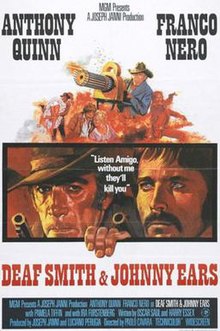

| Deaf Smith & Johnny Ears | |
|---|---|

U.S. film poster
| |
| Directed by | Paolo Cavara |
| Written by | Harry Essex Oscar Saul |
| Produced by | Joseph Janni Luciano Perugia |
| Starring | Anthony Quinn Franco Nero Pamela Tiffin Princess Ira von Fürstenberg |
| Cinematography | Tonino Delli Colli |
| Edited by | Mario Morra |
| Music by | Daniele Patucchi |
Production |
Compagnia Cinematografica Prima |
| Distributed by | Metro-Goldwyn-Mayer |
Release date |
|
Running time | 91 minutes |
| Country | Italy |
| Languages | Italian English |
| Budget | $1.2 million[1] |
Deaf Smith & Johnny Ears, also known as Los Amigos, is a 1973 Spaghetti Western film starring Anthony Quinn and Franco Nero. The film is loosely based on the life of Deaf Smith, with direction by Paolo Cavara.
The Republic of Texas has just gained its independence from Mexico. President Sam Houston sends Erastus "Deaf" Smith, a deaf-mute, and his partner Johnny Ears to stop General Morton's plot against the annexation of Texas by the U.S.
Their contact, a man named McDonald, and most of his family have been massacred by Morton and his men before they arrive. Hester, McDonald's surviving daughter, is married to Morton, and when Smith convinces her of the truth, she helps them overhear a German diplomat promise Morton a supply of weapons.
They have a saloon fight with Morton's gang. Johnny recognizes Suzie Q, a prostitute in a brothel, whom he had seen bathing in a river. Deaf pays so that his partner can spend a night with her. Johnny gets jealous of her other customers, but when she suggests they leave together using her money, he says that Deaf needs him; however, he later refuses to continue with the mission because he is in love.
Stealing dynamite from Morton's fort, Deaf almost is given away by the bells on a prostitute's garter, a gift he had kept in his pocket and forgotten. He is pursued into a cave by three men, killing one of them in a sneak attack by throwing his knife. As he comes from the cave, he sees the corpses of the other two men, killed by Johnny. Deaf gestures in jest that Johnny still owes him a punch.
They set a trap with explosives to blow up the German's weapons transport, but stop the explosion when they see children playing near the wagon train. Instead, they infiltrate Morton's fort and kill his men with explosives and a machine gun that Deaf can handle because he read the lips of the instructor. Johnny gives his gun to Morton for a shoot out with Deaf. Morton is killed.
Susie leaves with Johnny and Deaf. The next morning, Deaf is gone, having left Johnny his watch. Johnny cries out his name.
| Actor | Role |
|---|---|
| Anthony Quinn | Deaf Smith |
| Franco Nero | Johnny Ears |
| Pamela Tiffin | Susie, the Hooker |
| Franco Graziosi | Gen. Lucius Morton |
| Princess Ira von Fürstenberg | Hester McDonald Morton |
Director Paolo Cavara did not consider the film a spaghetti Western, instead calling it a "psychological western". He used a portable 35mm Arriflex camera.[2]
In his investigation of narrative structures in Spaghetti Western films, Fridlund discusses this film as a variation of the plot about partners that was used in many Spaghetti Westerns following the success of For a Few Dollars More. In contrast to the latter story, where the bounty hunter partners initially have a fight and one is revealed to have a secret motive of vengeance, the two protagonists of Deaf Smith & Johnny Ears form a steady bond from the beginning. Johnny acquires a secondary motive—a love interest—and their partnership is peacefully dissolved in the end. It is a story that concentrates on the problems of heroes and the methods they employ to reach their goals, especially the conditions arising from Smith's deafness.[3]